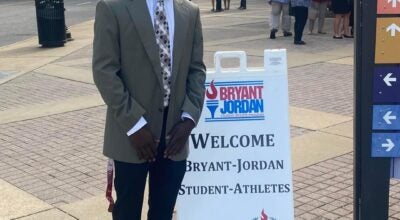Conservation Board hears criticism of “gassing”
Published 8:24 pm Monday, February 16, 2009
Alabama’s Conservation Advisory Board heard testimony Feb. 7 from both sides in the usual user-group conflicts concerning dog deer hunting and gill net fishing, but the topic that garnered the most attention tends to make most Alabamians cringe – the eastern diamondback rattlesnake.
Ken Darnell of Elmore County is in the business of collecting snake venom to use in the production of antivenin. The problem for Darnell is that some of the rattlesnakes he purchases to use in the venom production have been “gassed.”
“Gassing” snakes involves taking a long PVC pipe and poking it down into a gopher tortoise burrow. If a telltale rattle is heard, a small amount of gasoline is poured down the pipe and into the burrow. The snake will then flee the burrow and is easily caught.
However, Darnell said the use of gas significantly reduces the lifespan of the rattlesnakes.
“Some of my snakes, I’ve had for six years,” he said. “I’ve never had one that had been gassed to live more than two months. You can tell when they’ve been gassed. They just act different. With a healthy snake, I can collect venom every two weeks.
“I’ve been told that the people can’t produce enough antivenin without the Alabama venom production.”
Jim Godwin, a zoologist with Auburn University, and Craig Guyer, a herpetologist with Auburn, agreed that the practice of “gassing” should be eliminated.
“More than 300 species from birds to mammals to amphibians to reptiles use gopher tortoise burrows, including some rare and threatened species,” Godwin said. “The eastern indigo snake has not been reported in the wild since the 1950s. There is a long-term project underway to re-establish the eastern indigo snake in Alabama. If the practice of gassing continues, it could undermine our efforts.”
Guyer said it’s harder to determine how much the “gassing” affects the gopher tortoise, a protected species in Alabama.
“When you gas a burrow, the snakes can easily leave,” Guyer said. “The tortoise is reluctant to leave. Gas does bad things to lung tissue. This is a very serious concern.”
Board member Dr. Warren Strickland indicated he would make a motion at the March 7 meeting, which will be held at the Mann Museum at the Montgomery Zoo, to ban the practice of “gassing” rattlesnakes.
Several speakers, including Edwin Lambert of the Coastal Conservation Association of Alabama, requested the designation of Florida pompano and Spanish mackerel as game fish species, which would prevent commercial harvest.
Bob Shipp, head of Marine Sciences at the University of South Alabama and vice chairman of the Gulf of Mexico Fishery Management Council, said the two species need game fish status.
“Florida pompano is a species that has the potential to be a tremendous asset to our coastal tourism industry,” Shipp said. “It is one of the few truly exciting and desirable finfish that can be caught directly from shore while surf fishing. Yet due to overharvest by net fishermen, first purse seiners and currently Alabama net fishermen, their abundance has declined dramatically.
“Although the gill net ban in Florida has resulted in a resurgence of the species along the Florida west coast, which appears to have spilled over the Alabama shoreline, a much greater improvement in these stocks could result if we banned gill netting of this species and declare it a game fish.”
Shipp said results from the Alabama Deep Sea Fishing Rodeo indicate a significant decline in recreational catches of Spanish mackerel.
“As for Spanish mackerel, we have a similar but more recent situation,” he said. “For much of the last century, Spanish have been abundant and well-managed along the Gulf Coast. However, for the past several years, the commercial harvest has increased from several hundred-thousand pounds to nearly a million pounds.”
Philip West, representing the City of Orange Beach, asked for a buffer zone along the Gulf shore line around Orange Beach.
“Close to five million people visit the Alabama beaches each year and spend upwards of $1 billion,” West said. “We’re there to sell an experience. We believe the proximity of that (gill netting) practice detracts from that experience.”
Avery Bates, a five-generation commercial fisherman from the Bayou La Batre area, said the current economic crisis makes it unconscionable to consider restricting commerce along the Gulf Coast.
“Why would anybody, in this day and time, want to put anybody out of work when it’s so important to keep – not only keep five generations but 20 generations of fishermen – producing good, sound, healthy food from our waters,” said Bates, whose point was reiterated by several representatives of the seafood industry along the Alabama Gulf Coast.
The board was also asked by avid dove hunter Anthony “Skeeter” Fillingim to move Baldwin County into the North Zone to allow an earlier season opening. Fillingim said that by the time the South Zone opens in early October, the doves have scattered or departed due to migratory patterns.
Because doves are a migratory species and regulated by the U.S. Fish and Wildlife Service, any changes to the hunting zones in Alabama would have to be approved by the wildlife service. The earliest that could be done would be the 2011 season.
However, Conservation Commissioner Barnett Lawley said a change to the opening dates of the South Zone could achieve the same purpose if the public supports it.
Because of a board rule that no motion may be voted on unless discussed at a previous meeting, only proposals were raised at the Feb. 7 meeting.
Among the proposals are the 2009-2010 seasons and bag limits from the Wildlife and Freshwater Fisheries Division. One of the changes for the proposed seasons and bag limits would increase the unantlered deer season on National Forest Service lands in Calhoun, Clay, Cleburne, Franklin, Lawrence, Talladega and Winston counties. Another change would be to expand the alligator season in southeast Alabama to include not only Lake Eufaula but also the rest of Barbour County, as well as Henry, Houston and Russell counties. The season would also be expanded by seven days.
John Thomas Jenkins, Director of Marine Police, stated the division has no plans to ask for regulations concerning a speed limit on Alabama’s waterways or a 100-foot, no-wake zone from the shorelines.
Board member Dr. Wayne May also said he is working on a motion that would refine the definition of certain aspects of the supplemental feeding regulations currently in effect.






